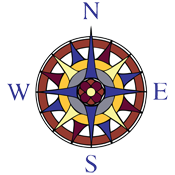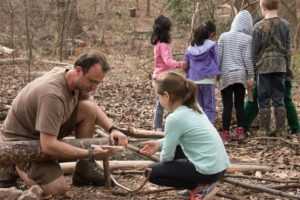
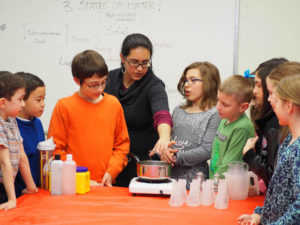
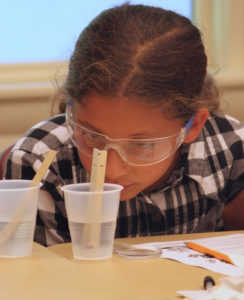
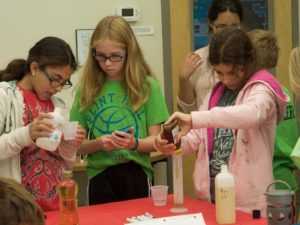
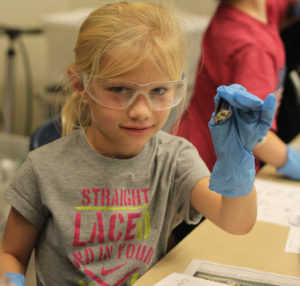
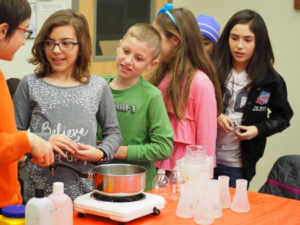
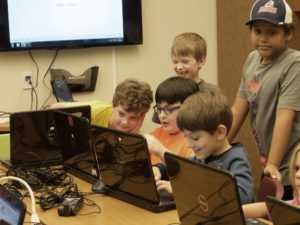
All | Math | Science/Technology | Extracurricular | Humanities/Social Sciences | Art/Music | Language Arts | Foreign Languages
3D Design & Printing Studio for Teens (Sem2)
Quarter 3,4: Starts on January 19, 2026
Class Time: 11:00 am Duration: 55 min
Instructor: JR Bontrager
Grade Range: 7th-12th
Prerequisites: None
Students will learn to think like inventors and designers when creating 3D! 3D design is used not only for modeling and fabricating objects but is also at the heart of many cutting-edge technologies such as AR and VR, video game design, interactive exhibits, and more. 3D printing is used in nearly all industries and design fields today from art to animation, manufacturing to medicine, and engineering to entertainment.
In this class, students will first learn to use Tinkercard, a 3D modeling software that works in solid forms (like LEGO bricks). Then, students will transition to MeshMixer, a software that creates smooth, curved, organic shapes (like clay). They will learn to think about their design from all angles and how to subtract forms to create holes, voids, and concave features, and add forms to create projections, contours, appendages, and convex details. They will discover the limitations of 3D printing and how to handle overhanging elements or delicate details.
Students will practice the artistic design process with simple sketches before diving into the software. They will be encouraged to use reference material, whether photos, a model, or even by modifying existing, public domain 3D files. Students will use an iterative printing process in which they print their project, check it for design intent, functionality, or fit, make modifications, and print again. The class will learn how to save and convert between 3D solid object files (.stl) and object files (.obj) and work with metadata fields to protect the intellectual property of their designs.
To demonstrate the range and capability of 3D-printed designs, favorite student projects include D & D miniatures, cosplay props, Minecraft-designed creations, and beloved characters such as anime, baby Yoda, and Pokemon creatures.
Second semester, continuing students will progress to more complex assemblies including multiple parts and parts with hinges. Second semester, some students may wish to work with alternative filaments such as TPU (rubber), metal, or magnetized filament. Because of the studio format, new students can enroll second semester.
The class instructor is a design engineer with 3D Herndon and expert in 3D technologies and other areas of design and invention. A typical class will be structured with 5-10 minutes of lecture or demonstration of a new design skill, followed by 40 minutes of design "studio" time where students can receive trouble-shooting support and design tips from the instructor and have dedicated work time, and 5-10 minutes of sharing time at the end of class. As a studio class, students will work on individual projects at their own pace.
Topics in this Series: As an open studio for individual projects, students may continue from one semester to the next or enroll mid-year. Students continuing from first semester receive priority pre-registration for second semester.
Prerequisites: None
What to Bring: Students will need to bring a laptop to class for design work.
Workload: Students should expect to spend 0-1+ hours per week outside of class.
Assignments: Project criteria will be explained in class to students.
Assessments: Informal, qualitative feedback will be given in class throughout the semester as the student works.
Lab/Supply Fee: A class fee of $25.00 is due payable to Compass on the first day of class for 3D printing and filament. This provides the student with 800 g of printed product per semester. Students who are prolific designers and print often will be asked to pay an additional $5.00 per 100 g or fraction thereof.
*This class will begin on 1/19 and meet on 3/9*
Credit: Homeschool families may wish to count this course as a component (partial) credit in Visual Arts, Technology, or Career Exploration for purposes of a high school transcript.
3D Design & Printing Studio for Tweens (Sem2)
Quarter 3,4: Starts on January 19, 2026
Class Time: 10:00 am Duration: 55 min
Instructor: JR Bontrager
Grade Range: 4th-6th
Prerequisites: None
Students will learn to think like inventors and designers when creating 3D! 3D design is used not only for modeling and fabricating objects but is also at the heart of many cutting-edge technologies such as AR and VR, video game design, interactive exhibits, and more. 3D printing is used in nearly all industries and design fields today from art to animation, manufacturing to medicine, and engineering to entertainment.
In this class, students will first learn to use Tinkercard, a 3D modeling software that works in solid forms (like LEGO bricks). Then, students will transition to MeshMixer, a software that creates smooth, curved, organic shapes (like clay). They will learn to think about their design from all angles and how to subtract forms to create holes, voids, and concave features, and add forms to create projections, contours, appendages, and convex details. They will discover the limitations of 3D printing and how to handle overhanging elements or delicate details.
Students will practice the artistic design process with simple sketches before diving into the software. They will be encouraged to use reference material, whether photos, a model, or even by modifying existing, public domain 3D files. Students will use an iterative printing process in which they print their project, check it for design intent, functionality, or fit, make modifications, and print again. The class will learn how to save and convert between 3D solid object files (.stl) and object files (.obj) and work with metadata fields to protect the intellectual property of their designs.
To demonstrate the range and capability of 3D-printed designs, favorite student projects include D & D miniatures, cosplay props, Minecraft-designed creations, and beloved characters such as anime, baby Yoda, and Pokemon creatures.
Second semester, continuing students will progress to more complex assemblies including multiple parts and parts with hinges. Second semester, some students may wish to work with alternative filaments such as TPU (rubber), metal, or magnetized filament. Because of the studio format, new students can enroll second semester.
The class instructor is a design engineer with 3D Herndon and expert in 3D technologies and other areas of design and invention. A typical class will be structured with 5-10 minutes of lecture or demonstration of a new design skill, followed by 40 minutes of design "studio" time where students can receive trouble-shooting support and design tips from the instructor and have dedicated work time, and 5-10 minutes of sharing time at the end of class. As a studio class, students will work on individual projects at their own pace.
Topics in this Series: As an open studio for individual projects, students may continue from one semester to the next or enroll mid-year. Students continuing from first semester receive priority pre-registration for second semester.
*This class will begin 1/19 and meet on 3/9*
Lab/Supply Fee: A class fee of $25.00 is due payable to Compass on the first day of class for 3D printing and filament. This provides the student with 800 g of printed product per semester. Students who are prolific designers and print often will be asked to pay an additional $5.00 per 100 g or fraction thereof.
Animal Kingdom Alive! (11 AM)
Quarter 4: Starts on March 16, 2026
Class Time: 11:00 am Duration: 45 min
Instructor: Various
Grade Range: 1st-3rd
Prerequisites:
Observe an owl, meet a Madagascar hissing cockroach, touch a giant tortoise, study a sea star, and peek at a porcupine! Meet live animals at Compass each week as we explore some of the major animal families through interactive presentations.
Each week, wildlife educators will bring a variety of animal ambassadors. They will discuss adaptations, habitats, diets, and diversity in the animal family. They will help students discover similarities and differences among species in animal families. Students will learn about adaptations and plenty of fun facts about the live animals that they meet each week.
This is a 45-minute program. Participants must be age 6 or older for the program.
Animal Kingdom Alive! (12 PM)
Quarter 4: Starts on March 16, 2026
Class Time: 12:00 pm Duration: 55 min
Instructor: Various
Grade Range: 4th-6th
Prerequisites:
Observe an owl, meet a Madagascar hissing cockroach, touch a giant tortoise, study a sea star, and peek at a porcupine! Meet live animals at Compass each week as we explore some of the major animal families through interactive presentations.
Each week, wildlife educators will bring a variety of animal ambassadors. They will discuss adaptations, habitats, diets, and diversity in the animal family. They will help students discover similarities and differences among species in animal families. Students will learn about adaptations and plenty of fun facts about the live animals that they meet each week.
Beginner 'Bots: Rush Hour! (Thu)
Quarter 3: Starts on January 22, 2026
Class Time: 10:00 am Duration: 55 min
Instructor: Becca Sticha
Grade Range: 2nd-3rd
Prerequisites: None
Discover the world of robotics using kids' favorite, interlocking building bricks! Students will build and program a different whimsical, mechanized project each week using the WeDo 2.0 robotics system by LEGO Education.
Third quarter, rush hour comes to Compass as students build and program automated vehicles like a dune buggy, Formula 1 race car, tow truck, tractor trailer, bus, and more.
Their robots will be built using special-shaped LEGO components from the WeDo Educational set, motors, motion sensors, tilt sensors and a programmable, Bluetooth control unit ("brain"). Student will use classroom tablets to program the control units using an intuitive drag-and-drop coding modules.
Prior experience with LEGO or coding is not required. All equipment is furnished.
This class will begin on 1/22/26 and meet on 3/12/26.
Topics in this Series: Animated Animals (Quarter 1), Jurassic Giants (Quarter 2); Rush Hour! (Quarter 3), and Creepy Crawlies (Quarter 4).
Biology- Lab (On-Level or Honors)
Quarter 1,2,3,4: Starts on September 12, 2025
Class Time: 9:30 am Duration: 85 min
Instructor: Tia Murchie-Beyma
Grade Range: 9th-12th
Prerequisites: None
This class will be taught in a Hybrid format with an online lecture on Mondays (10:00 am - 10:55 am) over a live, online platform and in-person lab and activities on Fridays (9:30 am - 10:55 am). Registration for the Lab section will automatically enroll the student in the Lecture section.
This full-year lab science course introduces classic biology topics updated for the 21st century. Biology studies living things and their relationships from microscopic to massive, ancient to modern, arctic to tropic. Our survey includes: (1) cellular and molecular biology, (2) ecology, (3) genetics, (4) biology of organisms (with selected human health and anatomy topics), and (5) evolution and diversity.
You will observe microscopic organisms and give monarch butterflies a health exam before tagging them for their 2,800 mile migration to Mexico. You will extract DNA, model its processes, and learn how scientists manipulate this magnificent molecule to make mice glow. You will observe animal behavior, test your heart rate, and practice identifying and debunking pseudo-science.
By the end of the course, students will be able to explain the nature of science as a system of knowing; cite evidence for foundational theories of modern biology; explain basic biological processes and functions; describe structures and relationships in living systems; outline systems of information, energy, and resources; demonstrate valid experimental design; discern ethical standards; relate their values and scientific ideas to decision-making; and apply biology knowledge to their own health.
Students are responsible for pre-reading and reviewing new material such as readings from the textbook and additional popular and scholarly sources, videos, and animations PRIOR to class meetings. In-person sessions focus on active discussion, clarification, exploration of content, review, modeling, and hands-on activities.
Labs address not only technical skills and sequential operations, but also forming testable predictions, collecting data, applying math, drawing conclusions, and presenting findings. Hands-on dissection, always optional, is taught with preserved crayfish and fetal pigs.
Sensitive issues: human reproduction is not taught separately, but mentioned as students learn about other, related topics such as sperm, eggs, stem cells, genetic disease, hormones, fetal development, breast-feeding, adolescence, and HIV. While there may be some debate-style discussion of topics such as GMO, abortion will not be debated. Birth control and sex education are not covered, but distinctions between gender and biological sex are discussed in detail in the genetics unit. Evolution is embedded in every topic, from molecular to ecological, inseparably from other content. It is addressed in a scientific context, not from a faith standpoint.
Levels: The course provides a substantive, full-credit experience on either an Honors or On-Level track. All class members share core material and participate in the same labs. Honors has longer or additional readings, more analytical work, and more thorough and difficult assessments. Brief, required summer assignments are due in August for those who elect to take Honors. Students register online for the same course, but must indicate which level they wish to study via e-mail by August 15. Students may move down a level (from Honors to On-Level) at any time.
Prerequisites: Students should be very strong, independent readers and able to understand graphs, tables, percentages, decimals, ratios, and averages.
Workload: All students should expect to spend 4-6 hours outside of class reading and preparing homework. Homework includes term cards, brief written responses, weekly online quizzes, unit tests, occasional lab reports, and some creative assignments including sketching. Students will sometimes prepare short, in-class presentations, participate in group projects, run simulations, or conduct simple experiments at home.
Assignments: All assignments will be posted on password-protected Canvas classroom management site. There, students access assignments; upload homework, take automated quizzes and tests; track grades; message instructor and classmates; and attend virtual conferences.
Assessments: Completed homework, projects, quizzes, and tests receive points and narrative feedback. Parents can calculate a letter grade using the student's points earned divided by points available, in weighted categories that include assignments, reading quizzes, tests, and participation and presentations. Parents may view all scoring and comments at any time through the Canvas site.
Textbook/Materials: Students must purchase or rent the textbook Biology Now: Third High School Edition (2022) published by WW Norton. A 360-day digital license directly from the publisher costs $53.00 HERE (ISBN: 978-0-393-54247-9) or $130 when bundled with a hardcover text (ISBN 978-0-393-54010-9). Used books may be available from 2022-23 students. Core textbook readings are supplemented by the instructor with updated information drawn from sources such as peer-reviewed science journals, popular science publications, and podcasts.
Lab/Supply Fee: A class fee of $130 is due payable to the instructor on the first day of class.
Supplies/Equipment: Students will need access to a computer/internet, compound microscope with 400X magnification and cool lighting, splash goggles, water-resistant/acid-resistant lab apron, kitchen or postal scale, 3-ring binder, approximately 400- 3"x5" index cards; and plain, lined, and graph paper. Some of these supplies are used at home. Weekly "Read Me First" web pages and class announcements on Canvas tell students what items to bring to class.
Credit: Homeschool families may wish to count this course as a full credit in Lab Science for purposes of a high school transcript.
Code for a Cause: Technovation Team for Girls (New Students)
Quarter 1,2,3,4: Starts on September 12, 2025
Class Time: 1:00 pm Duration: 115 min
Instructor: Mercy Wolverton
Grade Range: 7th-12th
Prerequisites: None
Imagine a phone app that could quickly reunite lost pets, connect the poor with resources that they need, or report a problem in the community! Code for a Cause is the Compass-based Technovation hub where middle school and high school girls will participate in the "world's largest technology entrepreneurship program for girls." Each year, Technovation teams solve real world problems through technology that they develop!
Through Technovation, girls work with women mentors, identify a problem in their community, develop a mobile app, and launch a startup. Since 2010, 140,000 girls around the world have developed mobile apps and small businesses to solve problems ranging from food waste and nutrition to women's safety, education, and much more. In this year-long program, girls will work in teams and learn the skills they need to change the world through technology.
First semester, the class will participate in team building activities and will be introduced to coding. Students will use Ozaria from Code Combat, a Python-based platform that applies stories and a gamified approach to teach the logic of coding and terminology. Once students understand these fundamentals, they will apply what they've learned in the PyCharm application outside of Code Combat's environment.
Second semester, students will form teams of 2-3 girls who will brainstorm and identify a community problem. They will propose a mobile app or AI solution to the issue and conduct market research to see if their idea is unique and feasible. Next, the team will begin developing an app following the Technovation curriculum using Python for the logic and Kivy for the Graphical User Interface. In class, girls will be coached step-by-step on the process of creating an interactive application. Finally, girls will learn how to brand their app, create a business plan, look at what it would take to bring the app to market and plan and record a pitch video for their app.
The weekly Technovation work sessions will be facilitated by an experienced Technovation coach and cybersecurity engineering student at GMU. In addition, there will be guest speakers spread throughout the semester talking on topics such as APIs, AI ethics, Marketing, Pitching to Investors, and more. Guest speakers in the past have had job titles such as CEO, Senior Cybersecurity Executive, Manager of Marketing and Communications, and Software Developer.
Participation in Technovation gives girls the confidence to pursue more computer science courses (70%) and the foundation to eventually major in computer science (26%). Technovation teams are in 100 countries, and the program is sponsored by Oracle, Google, 3M, Adobe Foundation, and others.
Level: All students will meet together, but student teams will compete in either Junior or Senior division depending the ages of the team members as of August 1, 2026: Junior Division is for girls ages 13-15, and Senior Division is for girls ages 16-18. In addition to the app and competition document, the Junior division has an additional submission of a User Adoption Plan. The Senior division has an additional submission of a Business Plan.
Workload: Students should expect to spend 1-2 hours per week outside of class.
Assignments: Will be posted on Teams classroom for students, and key reminders will be emailed to parents.
Assessments: Students will receive informal feedback throughout the project.
Lab/Supply Fee: A software fee of $50.00 is due payable to the instructor on the first day of class for access to Code Combat.
What to Bring: For this class, students should bring their laptop and charger. Chromebooks or Tablets cannot be used.
Non-Meeting Days: In addition to the scheduled days-off on the published Compass schedule, this class will not meet on 12/12/25, 1/16/26 or 5/15/26, plus one other date in both fall and spring to be announced.
Credit: Homeschool families may wish to count this course as a full credit in Technology or Career Exploration for purposes of a high school transcript.
Code for a Cause: Technovation Team for Girls (Returning Students)
Quarter 1,2,3,4: Starts on September 12, 2025
Class Time: 2:00 pm Duration: 115 min
Instructor: Mercy Wolverton
Grade Range: 7th-12th
Prerequisites: None
**Returning students meet for 1 hour (2:00 pm- 2:55 pm) first semester and for 2 hours (1:00 pm- 2:55 pm) second semester so they do not have to repeat instruction in Python coding.**
Imagine a phone app that could quickly reunite lost pets, connect the poor with resources that they need, or report a problem in the community! Code for a Cause is the Compass-based Technovation hub where middle school and high school girls will participate in the "world's largest technology entrepreneurship program for girls." Each year, Technovation teams solve real world problems through technology that they develop!
Through Technovation, girls work with women mentors, identify a problem in their community, develop a mobile app, and launch a startup. Since 2010, 140,000 girls around the world have developed mobile apps and small businesses to solve problems ranging from food waste and nutrition to women's safety, education, and much more. In this year-long program, girls will work in teams and learn the skills they need to change the world through technology.
First semester, the class will participate in team building activities and will be introduced to coding. Students will use Ozaria from Code Combat, a Python-based platform that applies stories and a gamified approach to teach the logic of coding and terminology. Once students understand these fundamentals, they will apply what they've learned in the PyCharm application outside of Code Combat's environment.
Second semester, students will form teams of 2-3 girls who will brainstorm and identify a community problem. They will propose a mobile app or AI solution to the issue and conduct market research to see if their idea is unique and feasible. Next, the team will begin developing an app following the Technovation curriculum using Python for the logic and Kivy for the Graphical User Interface. In class, girls will be coached step-by-step on the process of creating an interactive application. Finally, girls will learn how to brand their app, create a business plan, look at what it would take to bring the app to market and plan and record a pitch video for their app.
The weekly Technovation work sessions will be facilitated by an experienced Technovation coach and cybersecurity engineering student at GMU. In addition, there will be guest speakers spread throughout the semester talking on topics such as APIs, AI ethics, Marketing, Pitching to Investors, and more. Guest speakers in the past have had job titles such as CEO, Senior Cybersecurity Executive, Manager of Marketing and Communications, and Software Developer.
Participation in Technovation gives girls the confidence to pursue more computer science courses (70%) and the foundation to eventually major in computer science (26%). Technovation teams are in 100 countries, and the program is sponsored by Oracle, Google, 3M, Adobe Foundation, and others.
Level: All students will meet together, but student teams will compete in either Junior or Senior division depending the ages of the team members as of August 1, 2026: Junior Division is for girls ages 13-15, and Senior Division is for girls ages 16-18. In addition to the app and competition document, the Junior division has an additional submission of a User Adoption Plan. The Senior division has an additional submission of a Business Plan.
Workload: Students should expect to spend 1-2 hours per week outside of class.
Assignments: Will be posted on Teams classroom for students, and key reminders will be emailed to parents.
Assessments: Students will receive informal feedback throughout the project.
Lab/Supply Fee: A software fee of $50.00 is due payable to the instructor on the first day of class for access to Code Combat.
What to Bring: For this class, students should bring their laptop and charger. Chromebooks or Tablets cannot be used.
Non-Meeting Days: In addition to the scheduled days-off on the published Compass schedule, this class will not meet on 12/12/25, 1/16/26 or 5/15/26, plus one other date in both fall and spring to be announced.
Credit: Homeschool families may wish to count this course as a full credit in Technology or Career Exploration for purposes of a high school transcript.
Integrated Middle School Science (12pm)
Quarter 1,2,3,4: Starts on September 10, 2025
Class Time: 12:00 pm Duration: 55 min
Instructor: Manal Hussein
Grade Range: 7th-8th
Prerequisites: None
This year-long, hands-on science course is a survey of key concepts in the fields of Life Science, Physical Science, and Earth Science which will give 7th and 8th grade students the fundamentals they need to tackle high school-level Biology, Chemistry, Physics, or Environmental Science. Topics covered in this course will not only provide a foundation for higher level science, but will also boost the student's confidence and fluency in discussing scientific issues, applying scientific terminology, and using scientific equipment. Content covered in this course will also enable a teen to become a more educated reader and consumer of scientific news and information.
General life science themes include life cycles, food webs, scientific classification, cell structure, and human body systems. Topics in chemistry include states of matter, atomic structure, elements and the Periodic Table, and chemical reactions and solutions. Themes in physics include motion, position, speed and acceleration, weight (mass), gravity, friction, buoyancy and density, and electricity and magnetism. The earth science unit will cover the rock cycle, minerals, rocks, fossils, weathering and erosion.
In this class, students will learn about the principles of scientific investigations and engineering practices, the Scientific Method, and preparation of formal lab reports. They will practice taking measurements, recording data, converting units of measure, and related mathematical concepts such as significant figures, International System of Units, scientific notation, graphs, and data analysis. Students will learn how to provide evidence to support explanations and solutions for their investigations.
This class is appropriate for a tween or teen who has had limited middle school level science and who wants to prepare for high school science.
In general, a topic will be discussed one week and then the corresponding lab or activity will be performed in class the following week. Microscope work will be used in some life science labs. For a more robust introduction to life and lab sciences, students may want to concurrently register for the Dissection Lab class and/or the Bio Chem Learning Labs program.
Meeting Dates: This is a 29-week course witht the week off to be announced.
Workload: Students should expect to spend 1-2 hours per week outside of class on reading and homework assignments.
Assignments: All class announcements and assignments will be communicated via a Google Classroom.
Assessments: Informal, qualitative and constructive feedback will be given on submitted assignments. A quantitative score/grade will not be provided.
Textbook: Students should purchase Everything You Need to Ace Science in One Big Fat Notebook: The Complete Middle School Study Guide by Workman Publishing (ISBN # 978-0761160953)
Materials: Students should bring the following supplies to each class: colored pencils, glue stick, pens or pencils to write with, and a ruler. In addition, a laptop computer will be needed some weeks in class for data collection and some weeks at home for online quizlets.
Lab/Supply Fee: A lab fee of $100.00 is due payable to the instructor on the first day of class.
Credit: This course is not recommended as a high school credit.
Integrated Middle School Science (1pm)
Quarter 1,2,3,4: Starts on September 10, 2025
Class Time: 1:00 pm Duration: 55 min
Instructor: Manal Hussein
Grade Range: 7th-8th
Prerequisites: None
This year-long, hands-on science course is a survey of key concepts in the fields of Life Science, Physical Science, and Earth Science which will give 7th and 8th grade students the fundamentals they need to tackle high school-level Biology, Chemistry, Physics, or Environmental Science. Topics covered in this course will not only provide a foundation for higher level science, but will also boost the student's confidence and fluency in discussing scientific issues, applying scientific terminology, and using scientific equipment. Content covered in this course will also enable a teen to become a more educated reader and consumer of scientific news and information.
General life science themes include life cycles, food webs, scientific classification, cell structure, and human body systems. Topics in chemistry include states of matter, atomic structure, elements and the Periodic Table, and chemical reactions and solutions. Themes in physics include motion, position, speed and acceleration, weight (mass), gravity, friction, buoyancy and density, and electricity and magnetism. The earth science unit will cover the rock cycle, minerals, rocks, fossils, weathering and erosion.
In this class, students will learn about the principles of scientific investigations and engineering practices, the Scientific Method, and preparation of formal lab reports. They will practice taking measurements, recording data, converting units of measure, and related mathematical concepts such as significant figures, International System of Units, scientific notation, graphs, and data analysis. Students will learn how to provide evidence to support explanations and solutions for their investigations.
This class is appropriate for a tween or teen who has had limited middle school level science and who wants to prepare for high school science.
In general, a topic will be discussed one week and then the corresponding lab or activity will be performed in class the following week. Microscope work will be used in some life science labs. For a more robust introduction to life and lab sciences, students may want to concurrently register for the Dissection Lab class and/or the Bio Chem Learning Labs program.
Meeting Dates: This is a 29-week course witht the week off to be announced.
Workload: Students should expect to spend 1-2 hours per week outside of class on reading and homework assignments.
Assignments: All class announcements and assignments will be communicated via a Google Classroom.
Assessments: Informal, qualitative and constructive feedback will be given on submitted assignments. A quantitative score/grade will not be provided.
Textbook: Students should purchase Everything You Need to Ace Science in One Big Fat Notebook: The Complete Middle School Study Guide by Workman Publishing (ISBN # 978-0761160953)
Materials: Students should bring the following supplies to each class: colored pencils, glue stick, pens or pencils to write with, and a ruler. In addition, a laptop computer will be needed some weeks in class for data collection and some weeks at home for online quizlets.
Lab/Supply Fee: A lab fee of $100.00 is due payable to the instructor on the first day of class.
Credit: This course is not recommended as a high school credit.
Interdisciplinary Science: Foundations in Biology, Chemistry & Physics- Lab
Quarter 1,2,3,4: Starts on September 10, 2025
Class Time: 11:00 am Duration: 55 min
Instructor: Manal Hussein
Grade Range: 9th-10th
Prerequisites: Pre-Algebra
**This class will be taught in a Hybrid format with an online lecture on Mondays (10:00 am - 10:55 am) over a live, online platform and in-person lab and activities on Wednesdays (11:00 am - 11:55 am). Registration for the Lab section will automatically enroll the student in the Lecture section.**
Why do Mentos candies in Coke make a fizzy mess? How do skateboarders survive spins on a half-pipe? What causes some lithium-ion batteries to burst into flames? Answers to these questions can be found in the study of high school science!
Interdisciplinary Science is a year-long, introductory high school science course which examines the living and non-living worlds. This survey course introduces key concepts from Biology, Chemistry, and Physics, which will lay the foundation for students to pursue more rigorous, year-long high school science courses in each discipline. This course also serves as a science survey, or overview, for students who will not be pursuing a STEM field or advanced education.
Students will learn about the principles of scientific investigations and engineering practices, the Scientific Method, and the basic format of a lab report. They will practice taking measurements, recording data, converting units of measure, and related mathematical concepts such as International System of Units, scientific notation, graphs, and data analysis. Students will learn how to provide evidence to support explanations and solutions for their investigations.
Topics in biology will include molecular, cellular, classification, organisms, populations, and ecosystems. Students will explore the relationships between living things and their environments. The chemistry units will cover the composition of matter, atomic structure and periodic table, and chemical bonds and reactions, while the survey of physics will include forces and motions; conservation of energy, thermal energy, electricity and magnetism; and wave phenomena, characteristics, behavior, including electromagnetic and sound waves.
Meeting Dates: This is a 29-week course with the week off to be announced.
Format: This is a hybrid course with the lecture taught synchronously online on Mondays and hands-on experiments done in a lab on Wednesdays.
Prerequisites: Students should have completed 8th grade math or a course in Pre-Algebra prior to taking Interdisciplinary Science. They should be familiar with ratios, rates, proportions, decimals, percents, exponents, and solving one-variable equations.
Class Expectations: For both in-person and virtual class meetings, students are expected to come prepared, have class materials, and be ready to participate in class discussions and activities. During virtual lectures (Mondays), students are expected to be seated at a desk or table and have their cameras on.
Workload: Students should expect to spend 2-3 hours per week outside of class on reading and homework assignments.
Assignments: All class announcements and assignments will be communicated via Google Classroom.
Assessments: Informal, qualitative and constructive feedback will be given on submitted assignments. A quantitative score/grade will not be provided.
Textbook: Students should purchase or rent Physical Science - Interactive Science by Pearson / Savvas Publishing (ISBN # 978-0133209266) and Biology For Dummies (ISBN # 978-1119345374 )
Materials: Students should bring the following supplies to each class: Five Star spiral graph ruled notebook, scientific calculator, colored pencils, glue stick, pens or pencils to write with, and a ruler. Students will be asked to bring a laptop to class on some days.
Lab/Supply Fee: A lab fee of $100.00 is due payable to the instructor on the first day of class.
Credit: Homeschool families may wish to count this course as a full credit in Lab Science for purposes of a high school transcript.
Mastering Microsoft Office: Excel (Certificate Program)
Quarter 3,4: Starts on January 23, 2026
Class Time: 12:00 pm Duration: 55 min
Instructor: Tayler Shreve
Grade Range: 9th-12th
Prerequisites: None
You might have gone through high school using beginner-level Google tools like Docs, Sheets, and Slides, but to prepare for college and career, it might be time to learn Microsoft Office 365. While Google Workspace applications are generally liked for their ease of collaboration and cloud-based accessibility, Microsoft Office 365 tools are preferred in many majors and industries for their advanced features, refinement, and computing power. Any high school student who plans to pursue a college major in business, science, engineering, or other data-driven field should learn Microsoft Office, and anyone wishing to enter the job market or enhance their resume with recognized credentials as a Certified Microsoft Office Specialist should take this class. Furthermore, any student bound for college or the work world who is not proficient in these computer applications can take this class to catch up on 21st century skills.
Second semester, students will work through official Microsoft study materials to become certified as a Microsoft Office Specialist (MOS) in Excel. Working in Excel will help as student create and manage worksheets and workbooks that can become professional-looking budgets, financial statements, sales invoices, data logs, and performance charts. Specific skills covered in the Excel Associate curriculum include: creating cells and ranges; creating tables; applying formulas and functions; creating charts and objects; creating and editing a workbook with multiple sheets; and using a graphic element to represent data visually.
An additional benefit of this course may be earned college credit. The American Council on Education (ACE) has recommended that MOS certifications in Word, Excel, and PowerPoint be considered as computer application in higher education institutions. 1800 accredited ACE-member, degree-granting colleges, universities, and other education-related organizations may award college credit to students who earned these certifications.
Prerequisite: Basic keyboarding skills.
Levels: Students who take this course on-level can earn MOS certifications. Students who take both semesters of this course will additionally qualify as a Microsoft Office Specialist: Associate level for earning at least three certifications. Students who wish to pursue a more rigorous curriculum and designate this as an "honors" level course on their transcript can self-study for the Microsoft Office Specialist: Expert level which requires two additional exams passed at the Expert level (and additional testing fees of $200.)
Equipment: Students should bring a laptop to class which has a local copy of Microsoft Office 2019 installed or a current subscription and access to Microsoft Office 365.
Course Materials: Students will work from the official Microsoft Office Specialist study guides that will be provided in class and is included in the course tuition
Assessment: Students will take computer-based exams for each application: The MO-110: Microsoft Word (Microsoft 365 Apps)and the MO-310: Microsoft PowerPoint (Microsoft 365 Apps) first semester and the MO-210: Microsoft Excel (Microsoft 365 Apps) second semester.
Testing Fees: A fee of $100 per exam is required to take the Microsoft Office Specialist exams.
Non-Meeting Days: In addition to the scheduled days-off on the published Compass schedule, this class will begin on Friday 1/23, with one other day off with the actual dates to be announced.
Credit: Homeschool families may wish to count this course as a component (partial) credit in Career Exploration or Technology for purposes of a high school transcript.
Robot Fab Lab: Tomb Explorer (Thu)
Quarter 3: Starts on January 22, 2026
Class Time: 11:00 am Duration: 55 min
Instructor: Becca Sticha
Grade Range: 5th-6th
Prerequisites: None
Design, build, and program an explorer robot to navigate newly discovered, unmapped ancient tomb. Each week, students will improve their robots though the addition of new sensors and components and will program their devices to navigate a maze and collect treasure.
Students will use the brand new LEGO Education Spike Prime robotics sets. They will build with motors, wheels/axles, gears, levers, and special components. Students will have to install touch, sound, color, and infrared sensors while also learning to program sequences and commands that use input/output devices for controlled movements and precise turns. Using the drag-and-drop Spike Prime coding menu, students will learn to program their robots while experimenting with key concepts such as fixed values, variables, loops, and logic constructs.
This course integrates science, engineering and computational thinking while introducing physical constraints, units of measurement, and coordinate systems. But, don't worry, this is a beginning robotics class. Prior experience is not expected, but returning students are welcome. Each student will build his/her own robotic project, so students can progress and customize at their own pace. In general, in this class, students will spend two weeks assembling, three weeks programming, and two weeks testing and re-designing their projects.
This class will begin on 1/22/26 and meet on 3/12/26.
Topics in this Series: Lunar Lander (Quarter 1); Battle Bots (Quarter 2); Tomb Explorer (Quarter 3), and Soccer Bot Showdown (Quarter 4)
13 events displayed.

